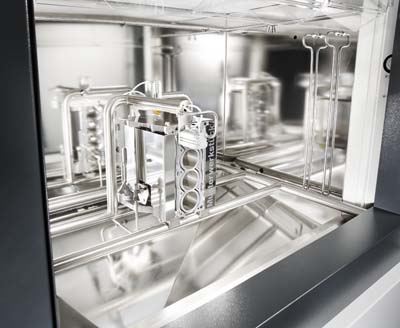Cleanliness Testing
Cleanliness Testing
Ever since the introduction of VDA 19, the task of monitoring technical part cleanliness has grown vastly in importance, not only in the automotive industry. One major drawback of cleanliness testing used to lie in the associated time-consuming and costly laboratory methods. With its new EcoCLab system, Durr Ecoclean now offers an automated in-line capability for inspecting and documenting particulate cleanliness in compliance with VDA 19. Thanks to this technology, results are obtained much faster and process reliability increases significantly.

Ever since the introduction of VDA 19, the task of monitoring technical part cleanliness has grown vastly in importance, not only in the automotive industry. One major drawback of cleanliness testing used to lie in the associated time-consuming and costly laboratory methods. With its new EcoCLab system, Durr Ecoclean now offers an automated in-line capability for inspecting and documenting particulate cleanliness in compliance with VDA 19. Thanks to this technology, results are obtained much faster and process reliability increases significantly.
Particulate cleanliness constitutes one of the most important quality factors today, both in the automotive industry and in numerous other manufacturing sectors. However, checking and documenting this so-called technical cleanliness presents a challenge to OEM and tiered suppliers alike. Quite often the particles specified as critical are found on interior part surfaces, e.g., inside the oil passages of a crankcase, so that tests relying on direct measurement methods are not feasible. In accordance with VDA 19 or ISO 16232, residual contamination analyses are then carried out in a separate laboratory. Here, particulate contaminants are first extracted from the part by means of a fluid before being collected on a filter and subsequently analyzed to customer specifications. This process, being decoupled as it were from the manufacturing environment, involves a time delay in the quality control loop which harbors the risk that already assembled parts may have to be recleaned or parts already shipped may need to be recalled at a high expenditure of time and cost. Users have therefore been calling for an in-line testing capability in carrying out VDA 19 compliant residual contamination monitoring. And this is exactly what Durr Ecoclean's innovative EcoCLab provides testing of critical areas on individual parts (e.g., crankcases) directly in the manufacturing line.
For the cleanliness test, the part to be analyzed is conveyed, after drying, to the extraction unit of the compact in-line cleanliness laboratory. Here the areas to be examined, e.g., the oil passages, are sealed off and flushed with a defined volume of fluid. The particle load picked up is then extracted from the fluid by means of a filter. The particulate matter collected on the filter is recorded and documented by an integrated camera system. Next, both particle sizes and amounts are analyzed. This makes it possible to judge both the total amount of particles and their size distribution. For instance, it can be certified that no particles larger than 600 µm are present in an oil passage. These findings are stored in the system's memory and can be issued in hardcopy form via an integrated printer. The automated cleanliness check takes only a few minutes to complete. The EcoCLab software and analytical electronics are easy to adapt to the specifications for diverse parts and other customer-defined requirements. The EcoCLab delivers results more quickly than conventional laboratory tests, but that is not all. Testing can also be carried out for a substantially more close-meshed monitoring scheme. Non-compliance with a defined residual contamination level will thus be discovered much earlier and can be remedied before expensive re-working or recall campaigns need to be launched. At the same time, the continuous cleanliness tests can improve the scheduling and integration of fluid treatment activities in the production workflow. Sudden major deviations from standard conditions, e.g., due to a defective filter in the fluid treatment system, will likewise be detected much more quickly. Also, changes in the overall process, such as inadequate pre-cleaning of machined parts in the machine tool, will be discovered rapidly from the resulting increase in particle collection levels. The EcoCLab in-line testing system is of compact modular design. It can thus be integrated directly into the cleaning system or may be installed at any other point of the manufacturing process.





